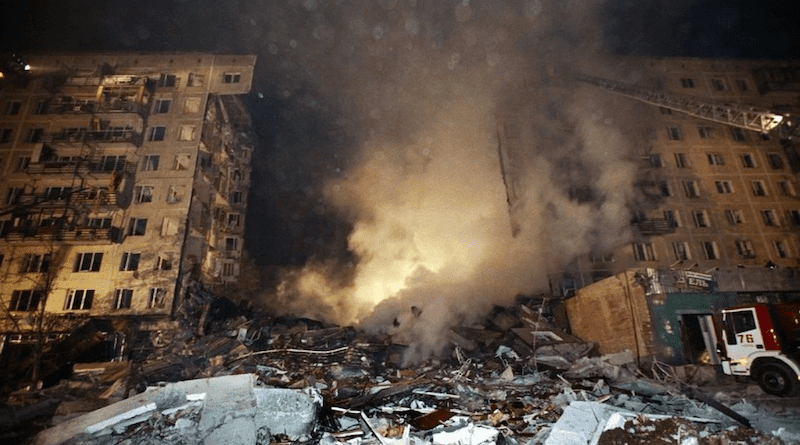Russia Damages Critical Infrastructure Across Ukraine In Massive Attack
By VOA
Russia launched another massive missile attack on Ukrainian cities on Saturday.
“Kyiv, Kharkiv, Odesa, Kryvyi Rih, Dnipro, Vinnytsia, Ladyzhyn, Burshtyn, Lviv region, Khmelnytsky and other cities were targets of terrorists. Civilian objects are everywhere!” Ukrainian President Volodymyr Zelenskyy said in his nightly video address.
At least nine people were killed and 64 were wounded, among them children, in the southeastern city of Dnipro. A Russian missile strike there destroyed a section of a nine-story apartment building, regional Governor Valentyn Reznichenko said. Infrastructure was also damaged in the Lviv, Ivano-Frankivsk, and Odesa regions, as well as in Kharkiv and Kyiv.
Targeting civilians and critical infrastructure across Ukraine has been a consistent tactic by Russia against its neighbor. According to the Geneva Conventions, targeting vital public infrastructure constitutes a war crime.
Zelenskyy said the death toll in Dnipro is expected to increase.
“Debris clearance is still ongoing and will continue throughout the night. It’s not yet known how many people are under the rubble. Unfortunately, the death toll is growing every hour,” he said. “My condolences to relatives and friends.”
Local authorities reported that Ukraine’s air defense downed Russian missiles in Mykolaiv, Odesa, Kyiv, Khmelnytskyi, Vinnytsia, and Ivano-Frankivsk. Ukraine’s top military commander said his forces shot down 21 of the 33 cruise missiles Russia fired.
The strikes caused emergency blackouts in multiple regions, such as the Kharkiv region and the city of Kharkiv — Ukraine’s second-largest city in the country’s northeast. In the western Lviv Oblast, Governor Maksym Kozytskyi said there might be interruptions in the power and water supply because of missile damage.
Another energy facility was hit in the western Ivano-Frankivsk Oblast, according to Governor Svitlana Onyschuk. A fire broke out at the site following the attack, Onyschuk said, adding there were no casualties.
Earlier, Odesa authorities said the missiles were launched “from air and sea,” while Southern Operational Command reported that five Russian missile carriers with a total of 36 Kalibr cruise missiles were detected in the Black Sea.
During the attack, a defiant Andriy Yermak, Zelenskyy’s chief of staff, said, “We will fight back.”
In the country’s Donbas, fighting continues to rage around Soledar, with Russia claiming to have captured the town and Hanna Malyar, Ukraine’s deputy defense minister, saying: “fierce battles for Soledar are continuing.”
Zelenskyy reiterated his pleas for more weapons from the West.
“What is needed for this? Those weapons that are in the warehouses of our partners and that our troops are so waiting for,” he said.
“No amount of persuasion or just passing the time will stop the terrorists, who are methodically killing our people with missiles, drones bought in Iran, their own artillery, tanks and mortars. The whole world knows what can stop and how it’s possible to stop those who sow death,” he said.
A few hours after Saturday’s missile strikes, Britain promised to send Challenger 2 tanks to Ukraine to help the country repel Russia’s invasion. It was not immediately clear how many tanks it will send.
British Prime Minister Rishi Sunak and Zelenskyy spoke on Saturday. After their phone call, Zelenskyy turned to Twitter to thank the prime minister “for the decisions that will not only strengthen us on the battlefield, but also send the right signal to other partners.”
Also Saturday, the British Defense Ministry posted an analysis of a deployment Wednesday of at least 10 vessels of Russia’s Black Sea Fleet — often referred to as the BSF — from the Novorossiysk Naval Facility.
“Given the type and number of vessels putting to sea at the same time, the activity is likely a fleet dispersal in response to a specific threat to Novorossiysk that Russia believes it has identified,” the ministry said via Twitter.
“It is unlikely that the deployment signifies preparation of unusual maritime-launched cruise-missile strikes,” the post said. “It is highly unlikely that the fleet is preparing for amphibious assault operations. The BSF largely remains fixed by perceived threats from Ukraine and continues to prioritize force protection over offensive or patrol operations.”

